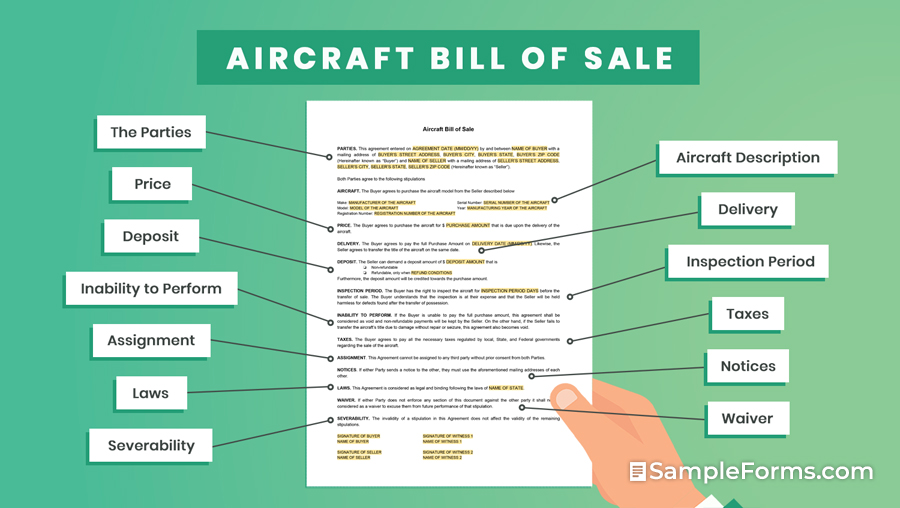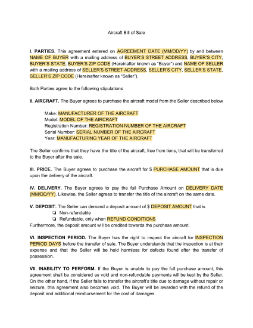- Eviction Notice Forms
- Power of Attorney Forms Forms
- Bill of Sale (Purchase Agreement) Forms
- Lease Agreement Forms
- Rental Application Forms
- Living Will Forms Forms
- Recommendation Letters Forms
- Resignation Letters Forms
- Release of Liability Agreement Forms
- Promissory Note Forms
- LLC Operating Agreement Forms
- Deed of Sale Forms
- Consent Form Forms
- Support Affidavit Forms
- Paternity Affidavit Forms
- Marital Affidavit Forms
- Financial Affidavit Forms
- Residential Affidavit Forms
- Affidavit of Identity Forms
- Affidavit of Title Forms
- Employment Affidavit Forms
- Affidavit of Loss Forms
- Gift Affidavit Forms
- Small Estate Affidavit Forms
- Service Affidavit Forms
- Heirship Affidavit Forms
- Survivorship Affidavit Forms
- Desistance Affidavit Forms
- Discrepancy Affidavit Forms
- Guardianship Affidavit Forms
- Undertaking Affidavit Forms
- General Affidavit Forms
- Affidavit of Death Forms
Aircraft Bill of Sale
From hiring and training the staff, purchasing, and maintaining the aircraft industry requires significant investment from its primary stakeholders. And since airline businesses engage in large-scale purchase deals with each other, including the sale of aircraft vehicles, they need to record the transaction through a bill of sale. Thinking of selling your aircraft to an airline company or individual? Read this article to find out how to seal the deal using a bill of sale. Read More
What Is an Aircraft Bill of Sale?

A bill of sale is a legal document that records the fundamental details of a sale and purchase transaction. It contains the details of both the buyer and the seller, as well as the main identifying details of the item sold. In this case, an aircraft bill of sale specifies the specific details of the aircraft, such as its model, manufacturer, registration number, and its serial number. All of these details are necessary to ensure that the item described in the document reflects the actual property.
How Do You Create an Aircraft Bill of Sale?
Aside from these basic details, the transfer of the aircraft’s ownership is also made evident. Say, for example, a private company decides to buy a plane from an existing airline company. The aircraft vehicle bill of sale reflects that at the execution of the deal, the seller no longer owns the property and no longer liable for it. This means that the buyer has full authority over the ownership, management, and maintenance of the particular item. Below we have steps compiled to guide you in creating your own aircraft bill of sale.
1.Know the Parties
The first part of any bill of sale is the introduction of the parties involved. It cements the role of each party in the agreement. The basic details of the buyer and seller, which are primarily their names and mailing address, are stated in this part. The most important thing to note while filling up this part of the document is the accuracy of the details. Misspellings and other typographical errors, especially with business entity names, will make the entire document false.
2. Provide an Accurate Description of the Aircraft
After identifying the role of each party, the next thing to point out is the description of the item sold. In this case, details regarding the particular aircraft or are pointed out. It usually starts with specifying the manufacturer of the property. The registration and serial numbers are also significant and vital identifiers of the property. Other descriptors asked in this form are the manufacturing year and the model of the aircraft.
3. Specify the Payment Deal
As the primary role of an auto bill of sale is to document a purchase transaction, it also contains the specifics of the agreed payment arrangement. The stipulations covering this topic contains the total purchase price and the method of payment. Arrangements regarding security deposit also fall under these provisions. Conditions regarding the refund of the deposit are also discussed. Also, another notion to consider concerning the payment is the delivery of the products. The decision of both parties regarding this issue is also presented at this part of the form.
4. Go Over the Additional Conditions
After going through the major parts of the form, make sure to double-check the other stipulations that are stated in the contract. These other yet still as essential notions include the inspection period that the seller grants to the buyer to thoroughly check the condition of the product before pushing through with the purchase. Other stipulations include the inclusion or exclusion of tax in the computation of the purchase price, the repercussions if one party is unable to provide their side of the bargain, and the assignment and severability of the contract. These stipulations play significant roles in making the transaction easier for both parties. It also protects each party from possible fraudulent actions of the other.
5. Take Note of Notarization
Although not all states have laws that require the notarization of this document, notarization is a vital process to prove the authenticity of the sale further. If notarization is required in your state, make sure to sign the document after standing witness before a notary public. The premature signing of the document will void the bill of sale form.
Frequently Asked Questions
Do all states require notarization of bills of sale?
Most states do not require their bills of sale to be notarized. As of recent years, these are the following states that require the process: Louisiana, Nebraska, Maryland, New Hampshire, West Virginia, and Montana.
Is an aircraft bill of sale necessary for its registration and transfer of ownership?
Yes, the process of transferring an aircraft’s ownership requires several documents. The process requires the registration application forms and evidence of ownership, which is the aircraft bill of sale.
Is the bill of sale considered as the aircraft’s title?
An aircraft technically does not have a title similar to what vehicles do. The bill of sale also does not serve the same purpose as vehicle titles. The document bearing the most similar purpose as a vehicle title is the aircraft’s registration certificate.
What is the difference between a title and bill of sale?
The bill of sale, as explained earlier, documents the details of a legitimate purchase transaction. On the other hand, a title proves the ownership of the property, or in this case, an aircraft.
Who should possess the bill of sale?
Ideally, both parties must have their personal copies of the document. Having individual copies will help both camps keep a record of all their sale transactions. But, most importantly, the buyer must keep the copy of the bill of sale together with the registration certificate or title for further registration or licensing processes.
Regardless of the business size, it requires forms and documents that will help record all kinds of transactions with other parties. Aircraft bills of sale play a significant role in recording and proving the legitimacy of their purchase transactions with other parties, especially when most of the parties involved have well-established reputations in their individual industries and areas.

